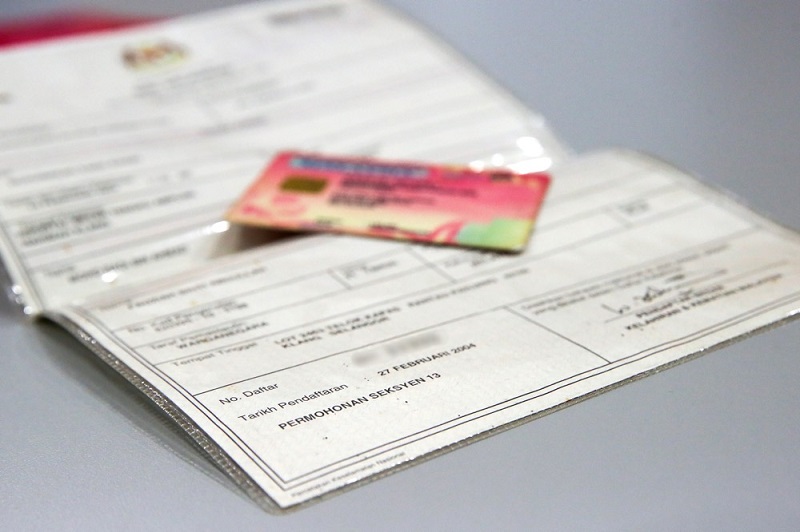PUTRAJAYA, Feb 8 — Malaysians who have no surnames are not subject to a law on the recording of the names of children in the National Registration Department’s (NRD) records, the Federal Court was told in the “bin Abdullah” case today.
Senior federal counsel Suzana Atan, who represented the NRD, said Section 13A of the Births and Deaths Registration Act (BDRA) revolved around the issue of surnames.
Noting that the word “surname” was not defined in the BDRA, she said the dictionary meaning of this word was family name, which she said was different from those who only have patronyms.
She said Section 13A does not apply to a Johor Muslim couple who wanted to have his name included as part of their illegitimate child’s name instead of having the “bin Abdullah” patronym used, saying that the father’s name in this case is not a surname and that the provision was not intended to allow for such inclusion.
“This is surname of mother or surname of that person who acknowledges. If it’s intended to be mother’s or father’s name, the provision will say name of that person,” she told the Federal Court yesterday.
Section 13A says that a legitimate child’s surname entered shall be the father’s surname if there is one, and among other things says that the surname of an illegitimate child may be the surname of the person acknowledging himself to be the father and at the latter’s request.
Suzana argued that the Federal Court should therefore answer no to the legal question of whether the Births and Deaths Registration Act 1957’s Section 13A applies to the registration of births for Muslim children and enables them to take their father’s surname.
This was one of three questions heard by the Federal Court yesterday in the NRD’s appeal against an earlier Court of Appeal ruling in the Johor Muslim couple’s case.
The two other questions were whether the Registrar of Births and Deaths may refer and rely on sources of Islamic law on legitimacy when registering the birth of a Muslim child, and whether the civil court may determine questions on the legitimacy of Muslim children for the naming and ascribing of paternity,
Parliament would have made it clear
Lawyer K. Shanmuga said that Suzana had acknowledged that the BDRA applies to both Muslims and non-Muslims, arguing that Parliament would have made it clear in the BDRA itself if they wanted to exclude any segment of Malaysians from being subject to Section 13A.
He said the BDRA has specific provisions when different treatment is intended for different races, such as allowing children of the ethnic Chinese group to register their names using Chinese characters.
“Nothing in Section 13 or Section 13A suggests it should not be used for Muslims or Tamils and many others in Malaysia.
“My submission is it can’t be the intention of Parliament to legislate in this way and exclude 70 per cent of the population. It must have intended to apply to all Malaysians,” he said.
If Section 13 and Section 13A were to be argued to distinguish between Muslims and non-Muslims, it would be discriminatory in the name of religion, he argued.
“You must preserve that a statute is non-discriminatory,” he said.
As for the issue of surname, Shanmuga said the Bahasa Malaysia translation of the BDRA had said the English version of the law was to be authoritative, suggesting that the word “surname” should not be given such a literal interpretation.
“We use surname for want of a better word to describe our naming system,” he said, having noted that he himself has no surname but would put his father’s name or his second name as the surname when filling up forms abroad.
He also suggested that the question of Section 13A’s applicability to Muslims required a more “nuanced” approach, pointing out that Suzana herself had highlighted that some Muslims had family names — such as Alhabshi.
“So it’s a nuanced question. The simple answer is it applies to all Malaysians,” he argued.
Chief Justice Tun Md Raus Sharif, who chaired the Federal Court panel today, said the decision will be delivered on another date to be fixed.
On September 3, 2015, the Johor Muslim couple — given the initials of MEMK and NAW — and their child had filed the lawsuit against the NRD, the NRD director-general and the government of Malaysia to seek the change of the “bin Abdullah” patronym to the father’s name in the birth certificate.
The Kuala Lumpur High Court had on August 4, 2016 dismissed the Johor Muslim couple’s lawsuit and ruled that the NRD director-general’s refusal to change the “bin Abdullah” patronym in the child’s birth certificate was lawful.
The Court of Appeal had on May 25, 2017 unanimously delivered a landmark ruling that quashed the NRD director-general’s decision to use the “bin Abdullah” patronym, also ordering him to correct the patronym in the birth certificate as he cannot override the father’s wishes to have his name used.
Noting that the NRD had based its decision on the National Fatwa Committee’s two fatwas dated 1981 and 2003, the Court of Appeal had said a fatwa is not law and has no force of law and cannot be the legal basis for the NRD D-G’s decision on the surname of illegitimate Muslim children.




















